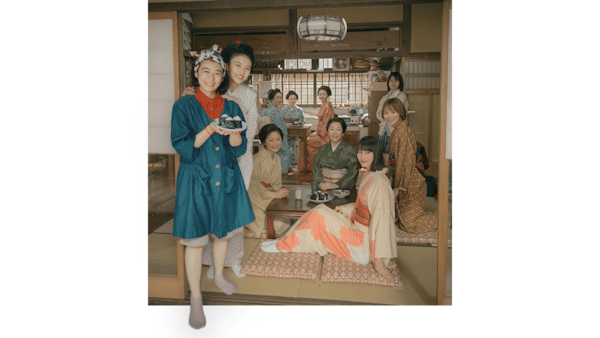Newsletter: The Makanai Is Bento-n Delivering Comfort Food
Hirokazu Kore-eda puts food front-and-centre in this Netflix series about two childhood friends who live and work in a home for apprentice geisha.

Last Updated: 04.07 PM, Jan 19, 2023
This column was originally published as part of our newsletter The Daily Show. Subscribe here. (We're awesome about not spamming your inbox!)
***
FOOD HAS ALWAYS taken centre stage in the films of Hirokazu Kore-eda. Cooking and eating it together act as medicine for the maladies afflicting his families, or at least as an emotional barometer to gauge the healing that still needs to take place. Tragedy and generational rifts may have ripped their souls apart. Come chow time, everyone will still gather around the low table. Food can even be considered a form of lingua franca, especially for the non-traditional family units, a convenient shorthand for calling up shared experiences and memories. When asked to choose a memory to take with him to relive for eternity, a man in After Life (1998) decides upon the memory of a warm meal — rice porridge mixed with miso and pickled plums — he ate when he caught a cold. Still Walking (2008) opens with a mother and daughter exchanging cooking tips as they peel, grate, chop, stir and sauté vegetables for a family feast in memory of the eldest son who died 15 years ago. Shoplifters (2018) opens with a young boy and his male guardian nicking food from a local supermarket to feed their makeshift family. The three siblings in Our Little Sister (2015) bond with their younger half-sibling by cooking and eating together.
Eight years after bringing Akimi Yoshida’s manga series Umimachi Diary to the big screen as Our Little Sister, Kore-eda brings Aiko Koyama’s manga series Kiyo in Kyoto to the small screen as The Makanai: Cooking for the Maiko House. For his first foray into streaming, the Japanese filmmaker puts food front-and-centre again in a series about two childhood friends who live and work in a home for apprentice geiko (geisha in Kyoto dialect). Another homey and wholesome portrait of a markedly unconventional sisterhood.
Set in the Gion district of Kyoto, the nine-episode series invites us into the sanctuary of these Japanese artists. Our point of entry: two teenagers, Kiyo (Mori Nana) and Sumire (Natsuki Deguchi), who move from rural Aomori with big geiko dreams, hoping to train in singing, dancing and music under the guidance of professionals. While the poised Sumire proves to be a natural talent and a quick learner, the klutzy Kiyo realises she isn’t quite cut out for the job. But she discovers her own natural talent may lie in the kitchen as she finds her place as the in-house cook, or the makanai, to the rookies, teachers and “mothers” of the maiko house.
Rather than impose a narrative, the show builds through an accumulation of day-to-day details, cosy conversations, and plenty of cooking and eating. This kind of ambience, made cosier by the natural light, inspires a feeling akin to spending a vacation in our head. Where the characters find so much joy and satisfaction in the act of cooking for others, Kore-eda seems to find eternal verities in this everyday exercise. Scenes of Sumire honing her craft and familiarising herself with the dos and don’ts of being a maiko alternate with Kiyo befriending the vendors at the marketplace, learning to cook for her cohabitants according to their specific tastes and moods, and broadening her culinary horizons. As the two get more comfortable with their respective skillsets, they also gain a better understanding of themselves and others.
The maiko house is populated by a diverse group of women: Kikuno (Kotoko Wakayanagi), Kotono (Kotoko Wakayanagi) and Tsurukoma (Momoko Fukuchi), like Sumire, are training to be geiko; top geiko Momoko (Ai Hashimoto) and ex-geiko Yoshino (Mayu Matsuoka) are the mentors; Ms. Azusa (Takako Tokiwa) and Ms. Chiyo (Keiko Matsuzaka) are the house mothers cluing the wannabe geikos in on the lifestyle; rounding out this family is Ms. Azusa’s snarky daughter Ryoko (Makita Aju). The safety and support found in this sorority are what undergird the show’s dramatic architecture. Among the performance highlights, a geiko version of Night of the Living Dead is everything you imagine it would be and perhaps more.
This depiction of geikos may be worlds apart from the films of Kenji Mizoguchi or the Orientalised vision of Arthur Golden’s Memoirs of a Geisha. Doing away with the misconception of geishas being prostitutes, Kore-eda reclaims the literal meaning of the word: “art person.” The professional entertainers we meet in The Makanai aren’t victims of an immoral patriarchal order. But their world can still feel anachronistic: no phones are allowed; no boyfriends; no marriage. When Momoko considers giving up her profession to marry for love or when Sumire’s father struggles to grasp why his daughter would leave school to train as a maiko, the show reveals dissonances of a traditional society in flux. Kore-eda is of course more interested in the day-to-day functioning of this nonconventional family and how its members depend upon each other. Though he gives us an insider’s perspective on their individual and collective sense of purpose, he stops short of taking on the role of cultural translator to dumb down the traditions for non-Japanese viewers.
For the non-Japanese viewers, food thus becomes a window to cultural understanding. For Kore-eda, it is a lens to explore Japanese identity. For we are what we produce and what we consume. As befits a show about food, the meal prepping, serving and feasting is shot so tantalisingly, we can almost smell it. Kiyo uses her grandmother’s recipes and her own preternatural instincts to cook for each of her housemates and offer them some modest comfort through food. Watching them enjoy the meal becomes an out-of-body experience for the viewer as well. The experience is sure to tickle the palate and leave you wanting to go out to eat after.
